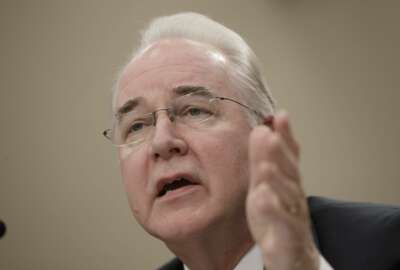To listen to the Federal Newscast on your phone or mobile device, subscribe on PodcastOne or Apple Podcasts. The best listening experience on desktop can be found using Chrome, Firefox or Safari.
- The House Armed Services Committee killed a proposal aimed at exposing more details about government officials’ travel on military aircraft. The legislation failed on a mostly party-line vote during the committee’s markup of the annual Defense authorization bill. It would have required the Defense Department to report to Congress every 90 days on how often executive branch officials and their spouses are using military aircraft instead of cheaper commercial flights. Opponents argued the provision was politically motivated, and would have created an unnecessary paperwork burden for DoD.
- Office of Personnel Management Director Jeff Pon said the four legislative proposals he submitted to change the federal retirement system are “very modest” compared to the other conversations he’s having. Pon said the ideas are not meant to punish current federal employees and retirees. Instead, they are more of a downpayment on changes the Trump administration wants to make for future federal employees. Pon said the government spends over $8 billion on federal retirement a month. The new legislative proposals would return $143 billion over 10years. (Federal News Radio)
- At least one Republican member of Congress is opposing the Office of Personnel Management’s legislative proposals. Rep. Mike Turner (R-Ohio) wrote to OPM Director Jeff Pon to voice his concerns. Turner said the changes would break a promise to current federal employees and retirees, who planned their lives and income around the current retirement system. (Rep. Mike Turner)
- The Consumer Financial Protection Bureau will shutter its student lending office according to an agency-wide memo from acting CFPB Director Mick Mulvaney. The office has returned more than $750 million to students it said were the target of abusive loan practices. Mulvaney said the office will join the agency’s “financial education” programs. Earlier this year, Mulvaney also restructured the Office of Fair Lending, which investigates discrimination issues mostly in the auto lending industry. (Federal News Radio)
- New guidance aims to better link cyber, privacy and supply chain risks. For too long, agencies worried about cyber risk, privacy risk and even supply chain risk in separate silos. But that is about to change. The National Institute of Standards and Technology released yesterday version two of the special publication 800-37, the risk management framework. It seeks to bring these issues together by giving agencies a path forward to confront these risks. The draft document also incorporates the concepts in the cybersecurity framework and offers insights on how management and mission can work together to address these challenges. Comments on the draft document are due by June 22. (National Institute of Standards and Technology)
- Military spouses might have an easier time getting a job with the federal government. President Donald Trump signed an executive order telling agencies to use their noncompetitive hiring authority to recruit more military spouses. The president’s Council of Economic Advisers said military spouses earn $12,000 less than other workers. The council said military spouses have trouble finding jobs because of frequent moves. Trump signed the executive order at an event honoring Mother’s Day. (Federal News Radio)
- A new bill would give National Guard members backdated pay from the time they are promoted and the time it takes the federal government to approve that promotion. Some guardsmen are waiting more than six months for the Pentagon to approve their promotions. Sens. Elizabeth Warren (D-Mass.) and Steve Daines (R-Mont.) sponsored the bill.
- The Air Force and the National Science Foundation are teaming up to increase the scientific workforce and improve space technology. The two organizations will collaborate on scientific and engineering research to bolster national security. The partnership will bring together working groups to discuss ideas, information, data and developments. (Federal News Radio)
Copyright
© 2025 Federal News Network. All rights reserved. This website is not intended for users located within the European Economic Area.





